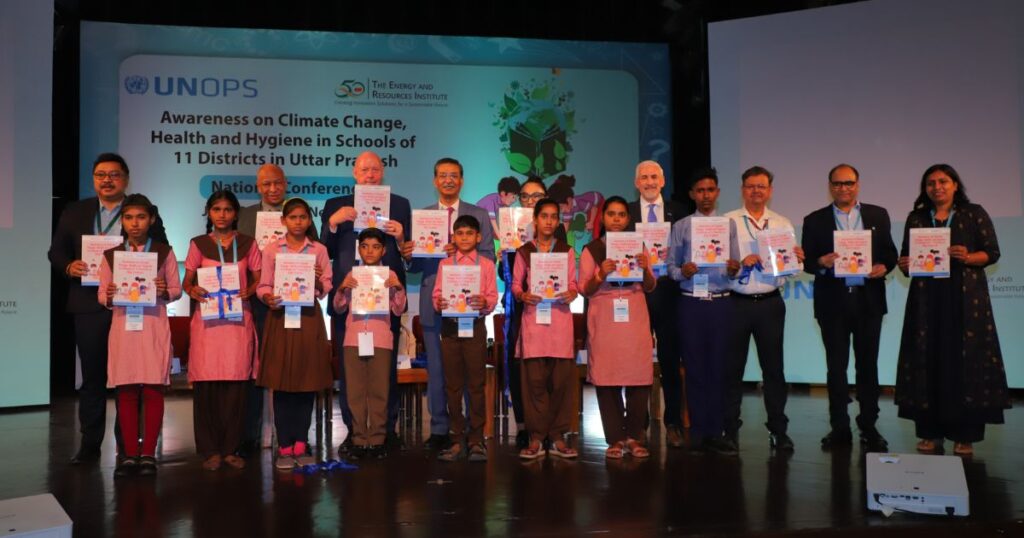New Delhi – A groundbreaking initiative aimed at educating school children about climate change, health, and hygiene across 11 districts of Uttar Pradesh, India, has concluded with a national conference in New Delhi. The collaborative project, spearheaded by The Energy and Resources Institute (TERI) and the United Nations Office for Project Services (UNOPS), brought together stakeholders from various ministries, UN agencies, and partners to share insights and discuss future scaling efforts.
Programme Overview and Objectives
The project was designed around three Sustainable Development Goals (SDGs):
- SDG 3: Ensure healthy lives and promote well-being for all at all ages.
- SDG 6: Ensure availability and sustainable management of water and sanitation for all.
- SDG 13: Take urgent action to combat climate change and its impacts.
Focusing on these goals, the initiative sought to improve public health, raise community awareness, and incorporate climate change adaptations into the education system. Special emphasis was placed on teenage girls, equipping them with the tools and knowledge necessary for effective water management and conservation. This focus was particularly crucial in areas facing significant challenges related to water, sanitation, health, and climate change.
Inaugural Addresses and Keynote Speeches
Dr. Dipankar Saharia, Senior Director at TERI, opened the conference by welcoming guests and dignitaries and congratulating the students for their active participation. “You all are the torchbearers of this initiative and shoulder the responsibility of spreading this vital message to your communities. This will significantly contribute to our sustainability goals,” Dr. Saharia remarked.
Vinod Mishra, Country Manager of UNOPS India, elaborated on the project’s groundwork and objectives. “Collaborating with the Government of Uttar Pradesh, we organized workshops for 27,000 children across 162 schools. By focusing on critical areas such as access to clean water, the impact of climate change, and comprehensive Water, Sanitation, and Hygiene (WASH) facilities, we directly address SDGs 3, 6, and 13. This initiative aims not only to enhance public health but also to empower communities through education,” Mr. Mishra explained.
Achievements and Impact
Dr. Neha, Senior Fellow at TERI, highlighted the project’s success in raising awareness among school children about climate change, water conservation, and menstrual health. “The initiative promotes sustainable water-saving practices in schools and aims to influence water management and conservation at both family and community levels,” she stated. The conference featured testimonials from student climate champions and a screening of a project video, showcasing the initiative’s on-ground impact.
ALSO READ: How a Blind Visionary and Women of Jharkhali Are Saving Their Villages from Devastating Cyclones!
Special Addresses by Dignitaries
Several prominent figures delivered special addresses, emphasizing the importance and impact of the project:
- Bharat Lal, Secretary General of the National Human Rights Commission, underscored the critical role of children and youth in achieving a developed India. “A clean and green India can only be realized by training and educating the youth,” he emphasized.
- Shombi Sharp, UN Resident Coordinator, highlighted the power of youth in driving sustainability. “India, with its large young population, has more potential for innovative solutions to global problems than any country before. This initiative is about empowering the youth and advancing climate action and climate justice for a sustainable future,” he stated.
- Freddy Svane, Ambassador of Denmark to India, stressed the importance of individual responsibility in combating climate change. “You, the young people, are the ones who can harness the benefits of a young democracy. Take individual responsibility and lead by example,” he urged.
- Muawia Elbukhari, Ambassador of Sudan to India, reiterated the importance of empowering students to address climate issues. “Students are the leaders of their communities. By surrounding them with messages on climate change, health, and sanitation, we are equipping them to tackle these issues effectively,” he said.
The capacity building programme on climate change, health & hygiene covered:
✅ 27,000 students
✅ 162 schools
✅ 137 villages
✅ 11 districts in Uttar Pradesh.
A student panel comprising 1 representative from each district shared their experience at the #NationalConference. pic.twitter.com/Zs08SlLqmF— JJM-UNOPS (@HarGharJal) June 20, 2024
Panel Discussions and Felicitations
The event included the launch of the Project Manual and a panel discussion on the role of students as change agents in disseminating knowledge and building community capacities on climate change, health, and hygiene. The panel, moderated by R R Rashmi, Distinguished Fellow at TERI, featured Yugal Kishore Joshi, Adviser at Niti Aayog, and representatives from various embassies, UN agencies, government bodies, and international partners.
ALSO READ: Retired Engineer Cracks Code to Grow World’s Most Expensive Crop at Home
Student Climate Champions were honored by distinguished guests, including the First Secretary of Panama, Freddy Svane, and Dr. Dipankar Saharia. Their contributions were celebrated, underscoring the vital role of youth in driving the project’s success.
ALSO READ: From Orphanage to IAS: B. Abdul Nasar’s Inspiring Journey in Civil Service
Future Commitment
The conference concluded with a ‘Way Forward’ address by Vinod Mishra, Country Manager of UNOPS India, and closing remarks by Elizaveta Zalkind, Coordination Specialist at the UNOPS Office of the Regional Director for Asia. Zalkind emphasized the importance of continuing to support and expand such initiatives to build a sustainable and resilient future through climate-resilient communities.
This collaborative project has set a remarkable precedent in integrating climate change education with public health and hygiene, empowering the next generation to lead the charge in creating a sustainable future. The commitment from all stakeholders to support and expand these efforts signifies a promising path toward building more resilient and informed communities capable of addressing the pressing challenges of climate change.


